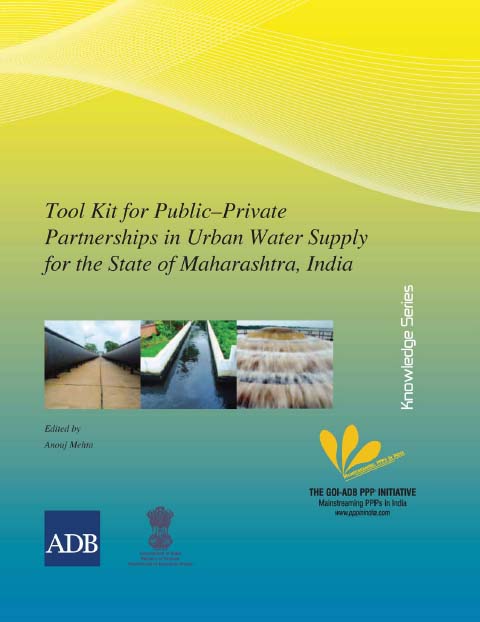/topics/wastewater
Wastewater
Decentralized wastewater management – An overview of a community initiatives in New Delhi - Vigyan Vijay Foundation
Posted on 05 Sep, 2011 11:40 AMThis paper by Ajit Seshadri, Vigyan Vijay Foundation highlights the poor sanitation situation in India and argues that centralized approaches to wastewater treatment have had limited success and there is a need to make wastwater treatment people centric and effective through the use of decentralized systems such as DEWATS (Decentralized Wastewater Treatment Systems). DEWATS are locally organized and people driven systems that typically comprise a settler, anaerobic baffled tanks, filter beds of gravel and sand, and an open pond. The open pond or the polishing tank recreates a living environment for the wastewater to clean itself, naturally.
Groundwater, self-supply and poor urban dwellers - A review with case studies of Bangalore and Lusaka by IIED
Posted on 24 Aug, 2011 08:32 PMIt investigates the difficulties they face and emphasizes the need for better integration of groundwater in the planning and management of urban water resources.
Delhi Water Privatization - WASH News and policy update
Posted on 03 Aug, 2011 06:20 PMContent courtesy: India WASH Forum
Public-Private Partnerships in urban water supply for Maharashtra – Tool kit by GoI-ADB PPP Initiative
Posted on 16 Jul, 2011 06:48 PM
The various possible PPP structures for the sector were studied, and their applicability assessed in the context of the selected sample cities. Consultations led to development of term sheets for these PPP structures, which were identified as most suitable and feasible for implementation.
The above exercise has led to development of this report, which may be considered as a tool kit designed to help decision makers decide whether a particular project might be suitable for the PPP route or not. The tool kit can, therefore, be the basis for approving a project implementation structure as part of the overall project approval methodology.
Establishment and management of community sanitary complexes in rural areas - A handbook by Water and Sanitation Program
Posted on 28 Jun, 2011 10:45 PM It is intended primarily for programme implementers to help them understand the critical need for Community Sanitary Complexes and inform them of the guiding principles to be adopted while planning for these.
It is intended primarily for programme implementers to help them understand the critical need for Community Sanitary Complexes and inform them of the guiding principles to be adopted while planning for these.
India remains one of the countries wherein concerted efforts are still required to eliminate the practice of open defecation. The lack of priority given to safe confinement and disposal of human excreta poses significant health risks manifest in the sanitation challenge facing the nation today.
The provision of sanitation facilities through public toilet complexes is the most suitable option for those who cannot afford individual toilets for monetary reasons or due to lack of space, and opt for open defecation. Such complexes are a useful and valuable option at public places, markets, taxi stands, etc., where a large congregation of people takes place. The Community Sanitary Complex (CSC) fosters the cognitive development of healthy sanitation practices in the community.
Scaling up rural sanitation: Findings from the impact evaluation baseline survey in Madhya Pradesh
Posted on 24 Jun, 2011 03:43 PMThis report is a part of a series of papers that analysed the baseline data from all countries where the program was implemented.
Soil biotechnology installation and water interventions at ACCEPT Society, Bangalore - Videos by Arghyam
Posted on 23 Jun, 2011 12:15 PM
Water interventions in the society
The society is an AIDS care hospice of about 5 acres, on the outskirts of Bangalore.
Workshop on 'Water and wastewater analysis', SEA, SERI, 26th - 31st July, 2011, Pune
Posted on 17 Jun, 2011 12:29 PMOrganizers:
- Shrushti Environment Academy (SEA), Pune
- Shrishti Eco-Research Institute (SERI), Pune
- Indian Environment Association (IEA), Pune Chapter
- Aavanira Biotech Pvt. Ltd., Pune
Venue: ‘Growth Lab’ Science & Technology Park, Pune-Nashik road, Opp. Panjerpole, Bhosari, Pune
Study of water supply & sanitation practices in India using geographic information systems - Some design & other considerations in a village setting - IJMR research paper
Posted on 06 Jun, 2011 05:01 PMThe study attempted to understand the phenomenon of water contamination in the village by using GIS as a tool to locate and map water supply and sewage distribution systems in the village, in relation to human and animal dwellings, their wastes, sanitary practices and their connections with drinking water quality for a clearer understanding of the connections between these factors and possible
Decentralised sustainable approach to sewage and waste water treatment for urban India
Posted on 31 May, 2011 03:17 PMthe small ponds, the lakes, the rivers flows into backwaters, the sea, and the wells catching the abundant rain water enabling such vegetation and greenery all around……
Water – also the factor, which brings the biggest of problems to urban life –
- mosquitoes,
- bad stench from clogged dirty canals,
- floods and water logging especially in the monsoons,
- roads breaking up because of poor drainage,
- drinking water scarcity in many parts of the city,
- water borne diseases and health problems





